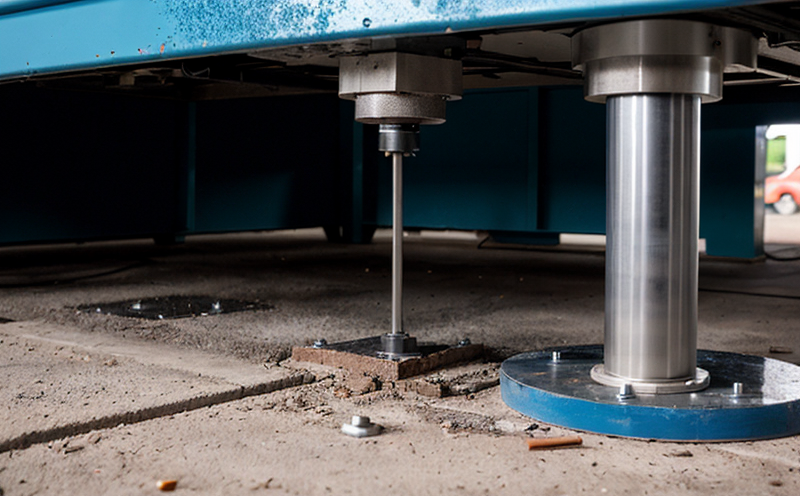ISO 17081 Residual Stress Measurement by Magnetic Methods
The ISO 17081 standard provides a robust framework for the measurement of residual stress in materials using magnetic methods. This service is particularly valuable in sectors where precision and reliability are paramount, such as aerospace, automotive, and medical device manufacturing.
Magnetic methods are based on the principle that the presence of residual stresses within a material can alter its magnetic properties, leading to changes in magnetization. By measuring these changes, it becomes possible to infer the magnitude and direction of internal stresses. This non-destructive approach is especially useful for assessing components where surface integrity must be preserved.
The process involves placing a sample under controlled conditions that induce stress relief, followed by measurement using magnetic sensors capable of detecting minute variations in magnetization. The data collected from these measurements are then analyzed to determine the residual stresses present within the material. This method is highly accurate and can provide insights into both compressive and tensile stresses.
One of the key advantages of ISO 17081 testing is its ability to identify potential sources of failure in critical components before they reach end-users. By ensuring that all parts meet stringent quality standards, this service helps prevent costly failures and recalls. Furthermore, compliance with international standards such as ISO 17081 instills confidence in customers regarding the reliability of products.
The testing procedure typically begins with careful selection and preparation of the sample according to specified protocols outlined in ISO 17081. Once prepared, the sample undergoes stress relief under controlled conditions to ensure accurate measurement results. Following this step, magnetic sensors are applied to specific areas of interest on the part. Data acquisition is performed using specialized equipment designed for precise measurement.
Post-measurement analysis involves sophisticated software algorithms capable of interpreting raw sensor data into meaningful information about residual stresses present within the material. Reporting follows strict guidelines set forth by ISO 17081, ensuring consistency and clarity across all reports generated from this service.
To illustrate how effective ISO 17081 testing can be in various applications, consider the following use cases:
| Use Case | Description |
|---|---|
| Aerospace Engine Components | Detecting residual stresses in turbine blades and other engine parts ensures their longevity under extreme operating conditions. |
| Medical Implants | Evaluating stress levels within implants helps minimize post-surgical complications by identifying potential weak points early on. |
| Automotive Structures | Identifying areas prone to fatigue failure due to manufacturing-induced stresses enhances overall vehicle safety and durability. |
| Military Equipment | Assuring that components used in defense applications are not compromised by residual stresses improves operational reliability during critical missions. |
In summary, ISO 17081 Residual Stress Measurement by Magnetic Methods offers a reliable means of assessing internal stresses within materials without causing damage. Its precision makes it ideal for industries where product integrity and safety are non-negotiable.
Eurolab Advantages
EuroLab prides itself on delivering comprehensive testing solutions tailored to meet the unique needs of our clients. When it comes to ISO 17081 Residual Stress Measurement by Magnetic Methods, we offer several key advantages:
- Expertise and Experience: Our team consists of highly skilled professionals with extensive experience in performing this type of testing.
- Comprehensive Reporting: All reports generated from ISO 17081 tests comply strictly with international standards, providing clients with clear and accurate information.
- State-of-the-Art Equipment: We utilize cutting-edge instrumentation that ensures precise measurements every time.
- Compliance Assurance: Ensuring all processes adhere to relevant regulations guarantees consistent quality across our services.
- Customized Solutions: We work closely with each client to develop bespoke testing protocols suited to their specific requirements.
- Prompt Turnaround Times: By streamlining our workflow, we strive to deliver results quickly without compromising on accuracy or detail.
- Comprehensive Support: Our dedicated customer support team is always available to answer queries and provide guidance throughout the testing process.
These factors combined make EuroLab your go-to partner for all your ISO 17081 Residual Stress Measurement by Magnetic Methods needs.
Customer Impact and Satisfaction
Clients who choose EuroLab for their ISO 17081 Residual Stress Measurement by Magnetic Methods needs can expect several benefits:
- Enhanced Product Quality: By identifying and addressing issues related to residual stresses early in the development cycle, our clients enjoy improved product quality.
- Increased Efficiency: Our streamlined processes ensure faster turnaround times without compromising on accuracy or detail.
- Better Decision Making: Armed with precise data about material properties, decision-makers can make informed choices regarding design improvements and process optimizations.
- Stronger Competitive Edge: Demonstrating compliance with international standards like ISO 17081 enhances a company's reputation among clients and stakeholders alike.
Customer satisfaction is paramount at EuroLab, and our commitment to excellence has resulted in positive feedback from satisfied clients who trust us to deliver reliable results every time.
Use Cases and Application Examples
The applications of ISO 17081 Residual Stress Measurement by Magnetic Methods span across multiple industries. Here are some prominent use cases:
| Industry | Possible Applications |
|---|---|
| Aerospace | Evaluating stress levels in engine components to ensure they can withstand high temperatures and pressures. |
| Automotive | Identifying weak points in structural elements to enhance vehicle safety and durability. |
| Military | Assessing the integrity of defense equipment subjected to harsh environmental conditions. |
| Bioengineering | Evaluating stress distribution within medical implants to prevent complications post-surgery. |
In each case, the ability to accurately measure residual stresses allows for better design decisions and improved product performance. This service plays a crucial role in ensuring that critical components remain reliable throughout their lifecycle.





